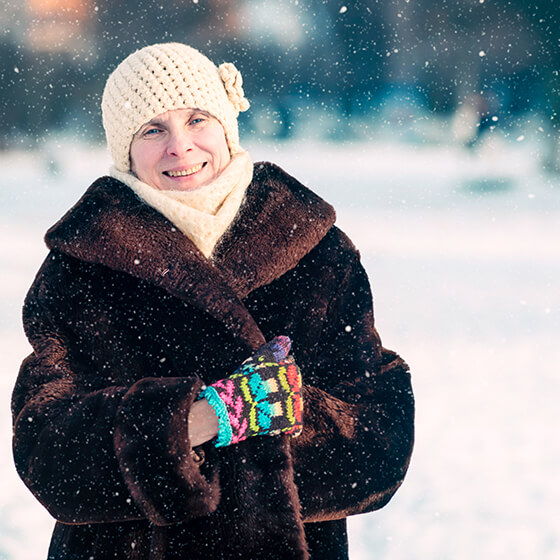As we move into the winter season, it is time for us to change our wardrobes from our fun summer outfits to our cozy sweaters to accommodate the increasingly colder weather. While comfy clothes and winter adventures may be something to look forward to, as an older person, it can present an uncomfortable challenge: the cold. Although getting cold during a brisk winter walk can feel refreshing for a younger person, a big chill can affect an older person’s immune system and even lead to hypothermia.
Hypothermia
Hypothermia is the condition that affects people when their body temperature falls lower than 35°C which can lead to health problems such as heart attack, kidney problems, liver damage, or worse. Not only does hypothermia affect seniors in cold outdoor conditions, but it also can affect seniors in buildings that are not well heated or insulated. This can be compounded by an already cold elder coming in from outside who is unable to warm up because of the ineffective indoor heating. Hypothermia can even happen in a group home or care facility if it is not kept warm enough. When you visit your loved one in a care facility, ensure that you are mindful of the temperature and your loved one has dressed appropriately.
Staying Warm
Staying warm is critical to the health and safety of your elderly loved one. Especially for those who are sick and are vulnerable to the cold. It may be difficult to physically acknowledge if you are keeping your home warm enough or if you are experiencing symptoms of hypothermia, especially if you live alone.
Tips to keep warm and save money:
- Set your heat to at least 21°C and keep the doors closed in rooms not in use
- Keep windows, blinds and curtains closed (check your windows for gaps to be fixed)
- Eat enough food to keep up your weight (body fat keeps you warm)
- Avoid alcohol as it lowers body temperature
- Sleep in warm pajamas with socks and a cap
- Connect with family and friends to ensure they can visit to check up on you
- Be careful with space heaters, they are a fire hazard and carbon monoxide risk
Dressing for the Weather
A wet and cold rain, sleet or wind can quickly lower your body temperature, so dressing for the weather can greatly increase your ability to stay warm and dry. Checking the weather daily and staying out of cold weather would be best, but if you need to go out, do so quickly and have a warm place to go home to increase your body temperature.
Dressing Tips:
- Dress in layers to stay warm and dry
- Wear a waterproof jacket if it is snowy or rainy to stay dry
- Wear loose layers of clothing as the air between the layers helps to keep you warm
- Accessorize! Pile on the hats, scarves, mitts, and other warm accessories
- Change your clothes if your clothes are damp or wet
A lower body temperature can bring great risk to seniors so it is valuable to be both proactive in avoiding cold and wet weather as well as prepare for coming home to a well-heated, insulated home with a warm, nutritious meal and a hot cup of tea. If you see signs of hypothermia in your elderly loved one, call 9-1-1 and wrap them up in a warm blanket. If you are concerned about the conditions of your elderly loved one, consider consulting your doctor and hiring a personal care worker to ensure the quality of care at home for your elderly loved one.
We also recommend you check these related posts in our Home Care Services blog:

